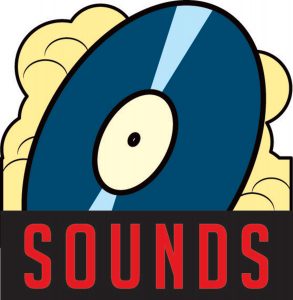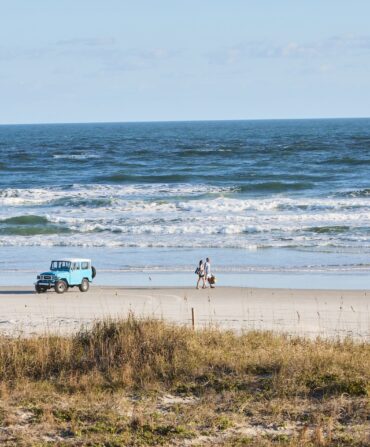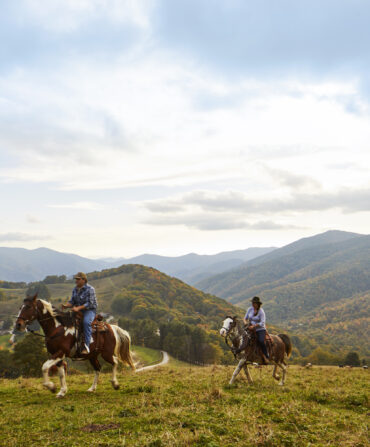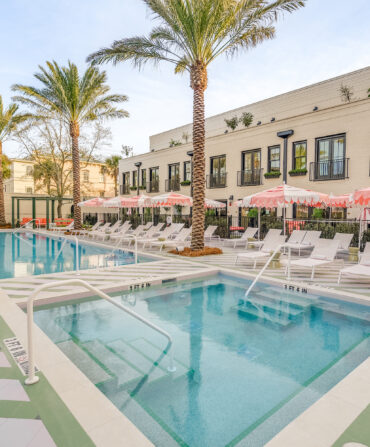Travel
Southern Road Trip: Memphis to Muscle Shoals
Southern music history comes alive on the path between Memphis and Muscle Shoals
Caught in a monsoon in Memphis, I’m fishtailing my way to Wild Bill’s, a jumping juke joint northeast of downtown. If Beale Street is for amateur music junkies, Wild Bill’s is the NFL. It’s only slightly after 11:00 p.m., but the air is thick with cigarette smoke and the smell of cheap beer. A strand of Christmas lights twinkle overhead. I order a forty-ounce of Budweiser (tall boys are a crowd favorite here) and a plate of chicken wings and watch as the place continues to fill up with Memphis locals, both black and white, and a handful of British men on a guys’ trip to Memphis and the Delta. By midnight it’s hopping, and the house band, the Memphis Soul Survivors, switches gears from soaring ballads to down and dirty Memphis blues. I put up my feet next to an old codger named James, and I ask him what he likes the most about Wild Bill’s. “The women,” he says with a wink. Fair enough.
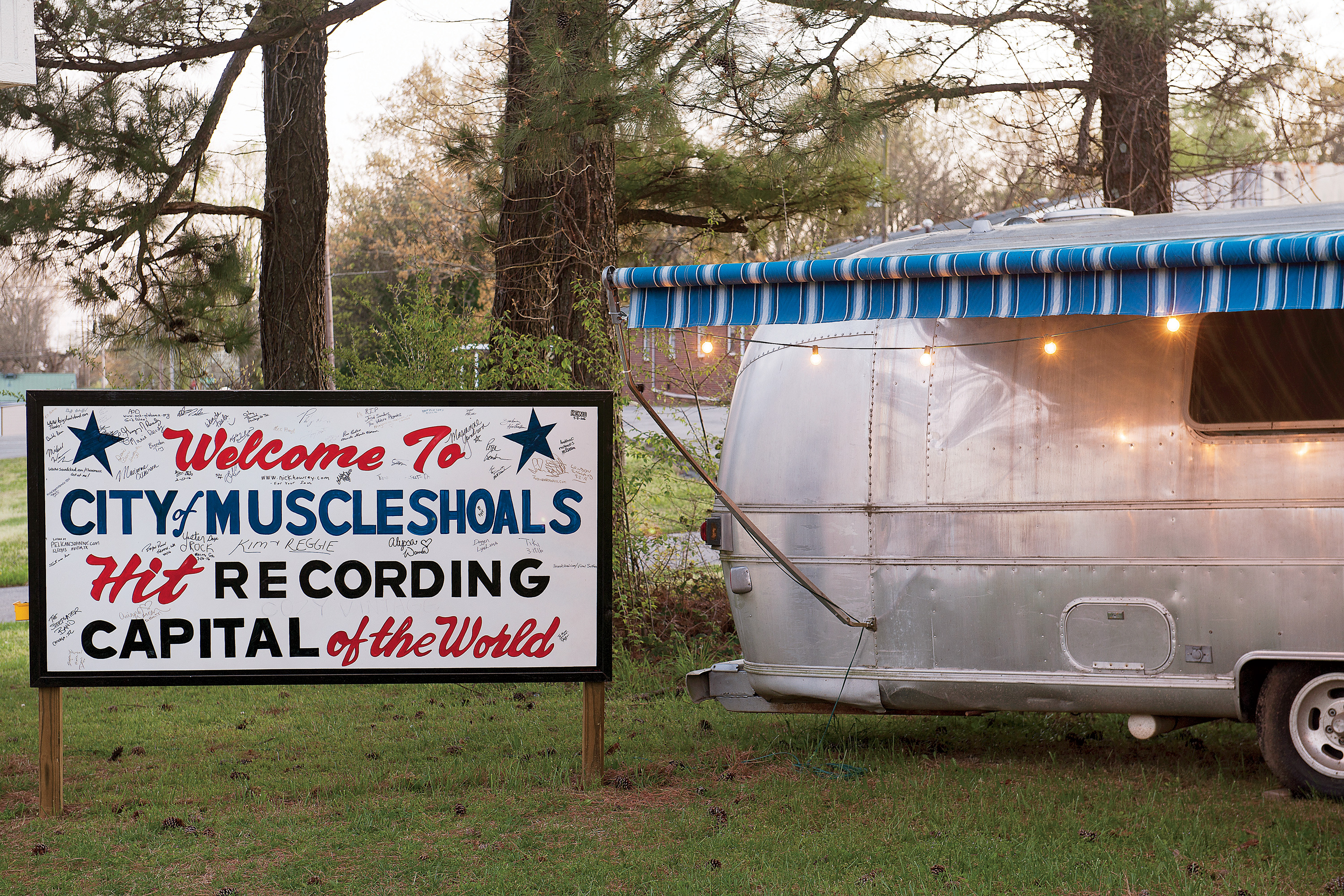
Photo: Robert Rausch
An old city welcome sign outside the Airstream gift shop at Muscle Shoals Sound Studios
The next morning I shake off the cobwebs and ready myself for a trip through the heart of Southern music history, from Memphis to Holly Springs, Mississippi, to Muscle Shoals, Alabama. It’s a road less traveled, lacking the cachet of a trip through the Delta or a spin through New Orleans, but one that is just as rich and engaging. Before leaving Memphis, I stop at the newly opened Blues Hall of Fame. You can spend an entire weekend visiting the city’s musical landmarks such as Sun Studio or the Stax museum. Add the BHOF to that list. The exhibit is small, but I whittled away an easy hour playing Hill Country blues on the iPad-like interactive jukebox. It gets me in the mood for the fifty-minute drive to Holly Springs, home to the late blues legends R. L. Burnside and Junior Kimbrough, who plied their trade in spellbinding, greasy guitar work.
BEHIND-THE-SCENES PHOTOS: SEE SNAPSHOTS FROM THE WRITER’S TRIP
Unlike in the Delta hotbed of Clarksdale, Mississippi, with its regular blues offerings, you have to do a bit of detective work to find live music in the Springs. Usually there’s a Kimbrough or Burnside relative hanging out next to the Hill Country Blues historic marker on the north side of the square who can point you to places like the Hut or Foxfire Ranch, which has blues on Sunday evenings. Beginning this summer, you can also catch live blues every Thursday night on the square, and in June the town hosts its annual Hill Country Picnic. But I always start with a visit to Mr. David Caldwell, the eighty-eight-year-old unofficial ambassador for Holly Springs, whose record store, Aikei Pro’s, is just around the corner from the square (look for a bunch of bikes outside; he gives them to local children as rewards for staying out of trouble). But don’t expect it to be easy to shop. His place is so full of papers and old stereo equipment that it’s hard to peruse the vinyl. “I gotta lotta work to do,” he says.
The shop is packed, and so is his mind—with knowledge of the area’s music (be advised there are no quick chats with Caldwell). Eventually he tips me off that Lightnin’ Malcolm is playing tonight at JB’s, one of the only bars in town. I drop my bag off at the Court Square Inn, a recently renovated mid-1800s storefront, which has three comfortable suites with veranda access and views of the square. The owner, Lisa Liddy, a lifelong Holly Springs resident, provides sundries for a continental breakfast, but better yet are her homemade lemon bars. Mouth stuffed, I still make a dinner pit stop at Phillips Grocery for one of the best burgers in Mississippi and then pull up to JB’s just as Malcolm plugs in. He goes hard for three hours of playing while walking around the bar, which hosts everyone from the mayor and other city dignitaries to kids home from Ole Miss for the weekend.
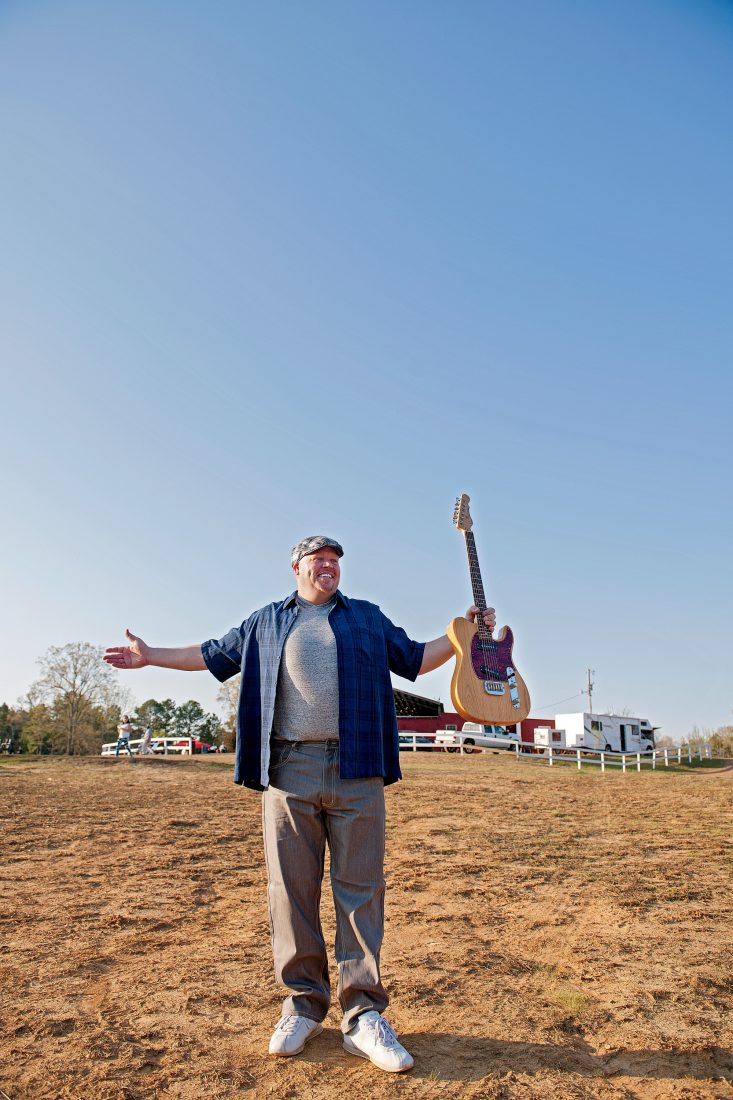
Photo: Robert Rausch
Lightnin’ Malcolm in Holly Springs
After breakfast the following morning—with Malcolm’s latest album on the stereo—I barrel on toward Muscle Shoals. There is not much to see on the 111 miles before you reach the Alabama Music Hall of Fame in Tuscumbia, which is a serviceable introduction to the area’s sound. But spine-tingling history awaits just minutes up the road at the Shoals’ Fame Recording Studios. Located between a CVS and a Pizza Hut, Fame has hosted such legends as Aretha Franklin, Otis Redding, and Little Richard as well as current acts, including Jason Isbell, Alicia Keys, and Band of Horses. Fame is still a working studio, but it’s open to the public for tours Monday through Saturday if the soundboard’s not booked. When I arrive, Gregg Allman is just finishing a ten-day stint at the studio, but the co-owner Rodney Hall graciously gives me a tour.
Hall takes me to the record closet where thousands of first-pressing original 45s are kept. I pull one out at random: “When a Man Loves a Woman” by Percy Sledge. I hold it carefully, but my hands start to quiver and I return it to the shelf. Hall grins. It isn’t the first time he’s seen someone do that. Hall also serves on the board of the nearby Muscle Shoals Sound Studios at 3614 Jackson Highway, where I see the bathroom where Keith Richards finished writing “Wild Horses.” The building is in the final stages of a renovation and is slated to reopen for tours and as a part-time studio this summer.
I’d gotten a tip from Ben Tanner, a native of the area and the Alabama Shakes’ keyboardist, to not miss Bunyan’s in Florence, Alabama (across the river from Muscle Shoals), for its infamous slaw dog—radioactive red, and covered in cabbage mixed with a mustard-vinegar sauce. As I sit in my car while it pours rain (again), I have to talk myself out of ordering six more. Florence has seen an influx of creative types, including John Paul White of the Civil Wars as well as Florence natives, such as Celeste Pillow, who have left and returned home. The gregarious Pillow owns Florence’s top restaurant, Odette, where we belly up to the bar and dig into one of chef Josh Quick’s signature global spins on Southern dishes, a rich catfish and shrimp cioppino. Odette serves as a sort of headquarters for Florence’s creative set, and I follow some locals around the corner to the intimate new club 116 E. Mobile (partly owned by Tanner and White). Inside, the singer-songwriter Langhorne Slim plays under candlelight to a rapt audience. He finishes up his set with a cover of the Warren Zevon classic “Lawyers, Guns and Money,” and everyone spills out into the neighboring alley. Memphis to Muscle Shoals: Even if the skies are gray, the sounds are pure gold.


